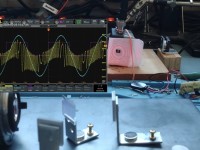Makeshift laser-vibrometer

With a few cheap and readliy available parts a desktop interferometer can be setup than may be used too measure the amplitudes in the micrometer regime of a vibrating membrane, e.g. loudspeaker etc.. The project was triggered by my previous E-field meter project, where a vibrating Al-foil is the sensing membrane.
In order to quantify the electrical signals observed in the expereiments with the E-field meter decribed in my latest prooject the question of the size of the membrane vobration amplitude arises. So motivated by this question and just the curiosity how much it would take to setup an interferometer that could provide the answer I played with some optical elements:
- a simple red laser-diode
- photo lens (from an old camera)
- 2 small mirrors
- a beam splitter (for first experiemnts a plain glass plate will do)
- a photodiode connected too a general purpose preamplifier
signal observation is done with an oscilloscope.
The mechanical setup was an on the fly arrangement on a stable steel plate fixing the elements with little magnets.
Surprisingly this worked quite well, with some math the observed signal coould be fully described and exact amplitude values determined.
But to get a reasonable estimate not muc math is needed, the FFT (oscilloscope) of the signal shows a well defined frequency edge that immediately yields the amplitude (velocity) value.
Allso the signal oscillation durin one vibration period may be counted ....
A full description can be found in the Attached description pdf.
- a simple red laser-diode
- photo lens (from an old camera)
- 2 small mirrors
- a beam splitter (for first experiemnts a plain glass plate will do)
- a photodiode connected too a general purpose preamplifier
signal observation is done with an oscilloscope.
The mechanical setup was an on the fly arrangement on a stable steel plate fixing the elements with little magnets.
Surprisingly this worked quite well, with some math the observed signal coould be fully described and exact amplitude values determined.
But to get a reasonable estimate not muc math is needed, the FFT (oscilloscope) of the signal shows a well defined frequency edge that immediately yields the amplitude (velocity) value.
Allso the signal oscillation durin one vibration period may be counted ....
A full description can be found in the Attached description pdf.



Discussion (1 comment)